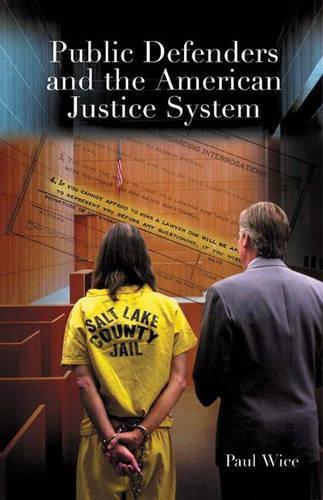
Public Defenders and the American Justice System
(Hardback)
Publishing Details
Public Defenders and the American Justice System
By (Author) Paul B. Wice
Bloomsbury Publishing PLC
Praeger Publishers Inc
30th June 2005
United States
Classifications
Professional and Scholarly
Non Fiction
Crime and criminology
Sociology and anthropology
345.73
Physical Properties
Hardback
224
Width 156mm, Height 235mm
510g
Description
Eighty to ninety percent of the nation's urban criminal defendants are defended in court by public defenders. Thus, understanding how these defender programs operate, their effectiveness and the quality of professional life for these beleaguered and often underpaid attorneys, is a critical factor in improving local criminal justice systems. What is it like to practice law in such an inhospitable environment, where clients often revile their counsel and prosecutors hold defenders in contempt How does a public defender maintain self-esteem and dignity What are the particular problems and obstacles of public defender offices And how might such departments overcome these obstacles so that defendants and defenders, as well as the public, benefit In vivid prose, and with vignettes and quotes from the lawyers themselves, Wice answers these questions and paints a truer picture of the state of public defenders offices than most of us have from television and the media.
Through a colorful profile of a reform-minded public defender's office Newark, N.J., one of the nation's most crime-ridden smaller cities, Wice examines the public defender system and shows how even the smallest reforms, especially those that address quality of life and work for public defenders, can make a big difference. Comparing the smaller defender's office to larger ones in such cities as New York and Chicago, which have not instituted significant reforms, the author illustrates the successes that can be found when change is implemented. Flaws remain, but with improved services and work environments, this important component of the overburdened criminal justice system can function more effectively, creating a system that benefits lawyers, defendants, and the community alike.
Reviews
Since the Supreme Court's ruling in Gideon v. Wainwright in 1963, states have been required to provide free counsel for those who are charged with serious crimes and cannot afford a lawyer. Establishment of a public defender system has been the most common response. This solution creates an office of publicly paid defense lawyers, which is in many respects the counterpart of the prosecutor's office. However, from the outset, public defenders have been stereotyped as cop-out artists, lazy, overburdened, or overly zealous. Wice, a leading scholar of the US criminal justice system, provides a marvelous antidote to these impressions. He offers a meticulous, fact-based study that paints a nuanced, insightful portrait of public defenders. Focusing on a single public defenders' office in one city (Newark, NJ), he provides a careful account of its functioning in a municipality rife with crime and few resources. What he finds is a remarkable group of lawyers, dedicated to the cause of justice, who perform tolerably well under almost impossible conditions. However, the book is no panegyric. Wice describes a flawed institution and in his concluding chapter offers suggestions for reform. Recommended. Upper-division undergraduates and above. * Choice *
Author Bio
Paul B. Wice is Professor of Political Science at Drew University and author of several books including Rubin Hurricane Carter and the American Justice System, Miranda v. Arizona, Court Reform and Judicial Leadership, Judges and Lawyers: The Human Side of Justice, and other related titles.
